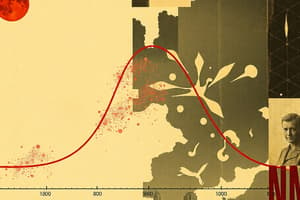Podcast
Questions and Answers
क्या है प्रासंगिकता वितरण के आधारअ्वल सबसे अच्छा उदाहरण है?
क्या है प्रासंगिकता वितरण के आधारअ्वल सबसे अच्छा उदाहरण है?
- ऊन और चमकीला
- ऊन और सोना
- ऊन और पानी का छप्पर
- पानी का पानी और पानी का छप्पर (correct)
किससे प्रासंगिकता वितरण में संदर्भित होता है?
किससे प्रासंगिकता वितरण में संदर्भित होता है?
- संभावनाएं (correct)
- उत्तर
- कुंजी
- संदेश
कौन सा समान्य जीवन वितरण है?
कौन सा समान्य जीवन वितरण है?
- सामान्य समारोह
- त्रिकोणमिति
- सामान्य वितरण (correct)
- पुनिति
प्रासंगिकता वितरण की मुख्य उपयोगिता क्या है?
प्रासंगिकता वितरण की मुख्य उपयोगिता क्या है?
कौन-सा प्रकार के प्रासंगिकता वितरण में हमें अनुमान लगाने में मदद मिलती है?
कौन-सा प्रकार के प्रासंगिकता वितरण में हमें अनुमान लगाने में मदद मिलती है?
'प्रासंगिकता वितरण' कैसे सहायक हो सकता है?
'प्रासंगिकता वितरण' कैसे सहायक हो सकता है?
किस प्रकार की वितरण को 'गौसियाई वितरण' या 'घंटी कर्व' के नाम से जाना जाता है?
किस प्रकार की वितरण को 'गौसियाई वितरण' या 'घंटी कर्व' के नाम से जाना जाता है?
बाइनोमियल वितरण का क्या क्या मूल्यांकन होता है?
बाइनोमियल वितरण का क्या क्या मूल्यांकन होता है?
प्वासन वितरण किससे सम्बंधित होता है?
प्वासन वितरण किससे सम्बंधित होता है?
'प्रति प्रयोग में सफलता की संभावना' और 'प्रयोगों की संख्या' के माध्यम से कौन सा वितरण पहचानने के लिए प्रस्तुत होता है?
'प्रति प्रयोग में सफलता की संभावना' और 'प्रयोगों की संख्या' के माध्यम से कौन सा वितरण पहचानने के लिए प्रस्तुत होता है?
'प्रति प्रसंस्करण में घटनाओं की संख्या' को मॉडल करने के लिए कौन सा वितरण प्रयोग में आता है?
'प्रति प्रसंस्करण में घटनाओं की संख्या' को मॉडल करने के लिए कौन सा वितरण प्रयोग में आता है?
Flashcards are hidden until you start studying
Study Notes
Probability Distributions
Probability distributions are a key concept in the field of probability and statistics. They provide a mathematical framework for modeling the randomness of events and the likelihood of different outcomes. In this article, we'll explore the concept of probability distributions, focusing on their role in statistical analysis and their various types, such as the normal distribution and other common distributions.
What are Probability Distributions?
Probability distributions describe the likelihood of different outcomes in a random event. They are functions that assign probabilities to all possible outcomes of an event, and they provide a way to measure the spread and central tendency of a set of data. For example, when flipping a coin, the probability distribution would assign a 0.5 probability to getting heads and a 0.5 probability to getting tails.
In statistical analysis, probability distributions are used to model data and make predictions about future events. They help us understand the variation and uncertainty in our data, and they can be used to make inferences about the population from which our sample is drawn. For instance, if we have a dataset of exam scores, we can use a probability distribution to model the distribution of scores and make predictions about the likelihood of getting a certain score on a future exam.
Types of Probability Distributions
There are many different types of probability distributions, each with its own unique properties and uses. Some of the most common types include:
Normal Distribution
The normal distribution, also known as the Gaussian distribution or the bell curve, is a continuous probability distribution characterized by its symmetric bell-shaped curve. It is widely used in statistics and has many applications, including in finance, physics, and engineering. The normal distribution is often used as a model for real-world phenomena that tend to cluster around an average value.
Binomial Distribution
The binomial distribution is a discrete probability distribution that models the number of successes in a fixed number of independent trials. It is often used in quality control and reliability engineering, as well as in statistical hypothesis testing. The binomial distribution is characterized by two parameters: the probability of success in a single trial and the number of trials.
Poisson Distribution
The Poisson distribution is a discrete probability distribution that models the number of occurrences of a rare event in a fixed interval of time or space. It is often used in fields such as epidemiology, physics, and reliability engineering to model the occurrence of rare events, such as the number of customer complaints or the number of car accidents.
Exponential Distribution
The exponential distribution is a continuous probability distribution that models the time between events in a Poisson process, which is a process where events occur randomly and independently at a constant average rate. It is often used in finance and economics to model the time between events, such as the time between insurance claims or the time between stock price changes.
Uniform Distribution
The uniform distribution is a continuous probability distribution that assigns equal probability to all outcomes in a given range. It is often used as a simple model for randomness and is used in many applications, including Monte Carlo simulations and random sampling.
Conclusion
Probability distributions are a fundamental concept in probability and statistics, providing a mathematical framework for modeling the randomness of events and the likelihood of different outcomes. By understanding the various types of probability distributions, such as the normal distribution, binomial distribution, Poisson distribution, exponential distribution, and uniform distribution, we can better understand the variation and uncertainty in our data and make more accurate predictions about future events.
Studying That Suits You
Use AI to generate personalized quizzes and flashcards to suit your learning preferences.




